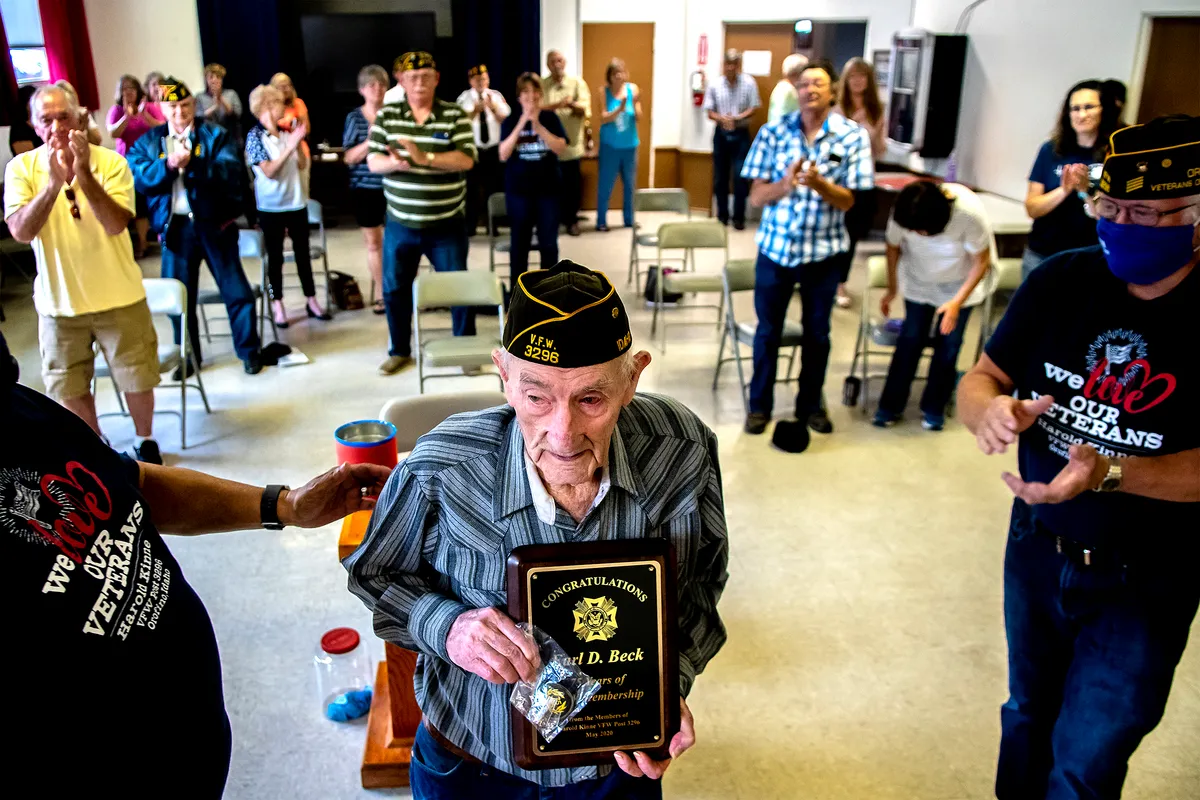Copyright Lewiston Morning Tribune

This story was originally published in the Lewiston Tribune on June 8, 2020. Earl D. Beck died on Sept. 3, 2021, at the age of 96. OROFINO — For three-quarters of a century, Earl D. Beck has been a cornerstone of the Veterans of Foreign Wars Harold Kinne Post 3296 in Orofino. Beck, 95, was honored for his service last week with a celebration and a plaque commemorating the event. “Oh, there was quite a few people there,” Beck said during a recent interview at his home. “My gosh, they had a whole gob of people (including several members of his family).” Beck, who has clear memories of past VFW members, as well as exact dates and even dollar amounts of some of the revenue taken in by the post, said he was surprised by the gathering. He applied for his 75-year pin some months ago and wondered why he hadn’t heard anything about it until he was asked to come to the center for a formal ceremony. He grew up around the Orofino area and worked on various ranches until in July 1944, at age 19, he was drafted into the U.S. Army. Beck went to basic training at Fort Ord, Calif., and vividly remembers being transported back to Seattle, where he and his comrades were eventually sent overseas. “They had us lined up to go to the Philippines, and all at once they put us in a cattle car, and I mean a cattle car,” Beck recalled. “Them old enclosed cars with the slats on the side, just the whole shipload of us, and sent us from Fort Ord, Calif., to Fort Lawton in Seattle, then shipped out of there and went to Hawaii on one of those Kaiser ships, little old scary ship.” After some more training, Beck and his 96th infantry division were sent to Okinawa, the second wave of a military landing on the embattled island. “They hit the beach on Okinawa,” he said. “We anchored out in the harbor there, and then all of us went in behind the first ones.” Beck’s group ended up dug into foxholes on a ridge. It was his job to run to a cache of supplies down the ridge and deliver them to the others. “Some way or another, I was down on the bottom of the hill. The captain had me down there in case he needed help or something, and they hollered down they were running out of ammunition. So we had a gob of it down there, and I had to grab a bunch of these bandoliers and belts and stuff that had clips of ammunition for their rifles and hand grenades, and up the hill I’d go on a run. “Then I’d get down where I had to crawl, and then I got to where I couldn’t crawl any farther and I’d throw the ammunition to them, to the closest one. They was pinned down in foxholes, and then they’d throw them to the rest of the guys. “Well, that was when I ran out of ammunition to throw to them. I didn’t crawl off the hill — I jumped up and run. Well, I made four trips up there like that, and I was a-going back down after the fifth load and that’s when I either stepped right on this mortar shell or my foot landed just above it, enough that it took almost all the shrapnel.” Most of Beck’s foot was blown off, as well as part of his hand, and there was damage to the right side of his face. He was blind, he said, for about 16 days. Two men lifted Beck from the spot and took him to an ambulance at the bottom of the hill. He was transferred to a nearby aid station, where his wound was cleaned, and days later sent to a hospital in Guam. There, doctors discovered gangrene in the leg wound and amputated it 11 inches below the knee. Later, back in the States, 5 more inches of his leg were taken off, and he was fitted with a prosthesis. He was discharged and had returned home by the time the Japanese surrendered in September 1945. Beck recalled his reaction to the news. “Oh, I was happy as hell that it was over,” he said. He paused, and his eyes grew glassy before adding: “I don’t know how in the world that Adolf Hitler thought he was going to conquer the world in the first place. His brain was twisted. And then he talked the (Japanese) into helping him. … Yeah.” Beck was hired as a clerk in the men’s department at the Orofino Mercantile and worked there for six years. The Veteran’s Administration paid for his training and supplied half of his $200-a-month salary for six years. But when his boss refused to give him a raise, “I told him what he could do with the mercantile ... and walked out.” He had saved a little money and took off for about three years. In the meantime, he met and married Dorothy Tierney. She had a son from a previous marriage, and she and Beck also had two boys together. The couple divorced in 1968. Beck eventually went to work for the state highway department and worked there for 22½ years. “I found out I could retire when I reached 55 years old, so I done it,” he said. “Never regretted one bit of it, either.” He never remarried, but after retirement he bought a snowmobile and he and a few friends spent every minute they could exploring the area on their machines. He also was active in the VFW. Shortly after returning home after his discharge, he joined a group of former World War I veterans who were in the process of remodeling an old plumbing shop into a veterans hall. “We hired a manager and bartenders, and at one time we had 11 slot machines in there, from a nickel slot machine to a dollar,” Beck said. The slot machines were hugely profitable — sometimes netting the organization more than $27,000 a month. “We always went in the hole with the bar because anyone feeding the slot machines and they wanted a drink, you just mixed it and took it to them. You didn’t charge anything,” he said. “I mean, those things made money. So we run them slot machines and that club until we had money enough to build that (new) building and $125,000 to run it with.” Beck, by that time, had been elected commander of the VFW post and remembers it as an exciting time of growth, but not without plenty of argument. “When we started going over plans for the building, if you could find that desk (the one he used as commander) I bet you could find gavel dents in the top of that son of a gun. Two or three guys would get on the floor at the same time and try and talk, and the only way I could get them to shut up and sit down was to hammer on that desk so that they couldn’t hear themselves think. And then they’d finally sit down.” The group also had its conflicts over rules for the organization. Beck said one member tried to insist that men who entered the VFW after 5 p.m. must wear a suit jacket and a tie. “We said no, this is too small a town for that,” he said. Eventually the current building on Michigan Avenue was completed and opened for business. “I didn’t even get to hold the first meeting. I wasn’t commander at that time. But I worked at the VFW all the time, it and the Jaycees. Oh, I had a ball. I worked with them on everything that come up.”



